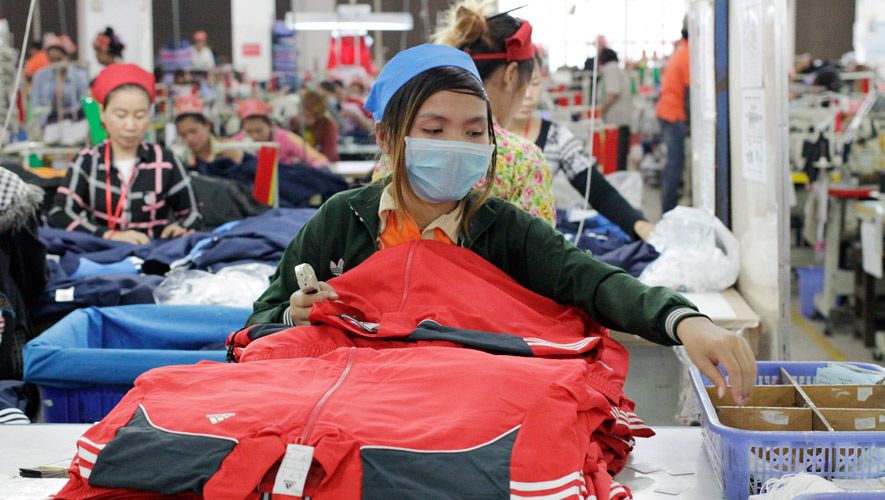The threat of Everything But Arms withdrawal by European Union is no longer an uncertainty as Cambodia scurries to implement reforms and measures to meet the international standards including freedom of association and addressing labour disputes. Currently, EU is conducting a six-month review over the need to maintain the EBA trade scheme. This follows concerns over Cambodia’s record against core human rights and labour rights conventions.
For the latest Cambodian Business news, visit Khmer Times Business
A recent chat with Prof Jan Orbie, EU external relations lecturer at the Department of Political Science, and Centre for EU Studies director at Ghent University, Belgium offered some clarity over the action by EU on the Kingdom. Below is an excerpt of the conversation:
Does EU always take a strict action?
Jan Orbie: It has only happened twice that preferences have really been withdrawn, Myanmar in 1997 and Belarus in 2000, two smaller countries that were already under attack by the international community. It is known in European foreign policy that double standards are often used when it comes to sanctions. The EU has a harder time sanctioning countries that are politically and economically important. I don’t think you can say that that is a purely objective application.
That idea that EU is a watchdog of democracy…
Jan Orbie: It’s not that romantic, I think (laughs). I also don’t feel called to defend Europe. Much has changed from 2001. In the last 10 years, we have seen greater concern from public opinion, politicians, civil society and trade unions about the impact of trade on sustainable development. There is a louder call for stronger action when human rights and labour rights are violated. Suddenly every citizen is involved in trade policy, whereas it used to be reserved for technocrats. The EU has felt the need to show that it wants to do something about it.
Rana Plaza also plays a role in this (the collapse of a textile factory in the 2013 in Bangladesh where more than 1,000 people died). A few days after Rana Plaza, EU Trade Commissioner, who was Karel De Gucht at the time, said, “We are going to have to see if we should sanction Bangladesh.”
Threats instead of sanctions, but Europe’s weapon continues to threaten, not so much to implement effectively?
Jan Orbie: Threats can be very effective. The shadow of sanctions can weigh heavily. But I think that once you apply your sanctions, you will lose actual leverage because there is little chance that after that, the government will still implement the reforms that you want. (For instance) we see nothing changed in Belarus. And in Myanmar, after 15 years, reforms did happen, but for reasons other than EU sanctions.
What is going to happen is that those in power can blame the difficult economic and political conditions on European sanctions. That they can blame the wrong for something, go abroad and strengthen themselves. Unless, and that is very cynical, the EU mainly wants to sanction to show European public opinion “we indeed put the word to the word”. For decades, the committee has been accused of not being tough enough. I think the threat of sanctions on Cambodia is indeed credible.
In the case of Cambodia, China’s influence only increases if the sanctions are implemented effectively. Is that what Europe wants?
Jan Orbie: The philosophy behind what Europe wants officially is to increase the discontent among the population (in order) to increase the pressure on the government. So, if sanctions are introduced in a few months, people and companies in Cambodia are hoping to turn to their government. That is the logic. I don’t know if they really believe that. You should ask the committee about that. But it seems unlikely that it works that way.
How big is EU’s soft power, the idea of imposing its standards through trade, and not weapons?
Jan Orbie: I think there is a consensus that today it is much smaller than 20 years ago. Right from the start of EBA, my criticism was that it was assumed that growth and exports automatically lead to development. And that is a kind of stubbornness in thinking that has often proved that it does not really work.
Sugar, is a good example of this. There was a fixed sugar price. A relatively high sugar price for European farmers, but also for sugar producers outside Europe. We received more free trade for sugar and the price collapsed. I think it is a little similar with textile. I can imagine that it would be interesting in the short-term for a country to export more textile.But those prices are outrageously low, our clothes are outrageously cheap. And apparently we do not succeed in ensuring that people who produce those clothes can do so in good condition.
So I have a clear vision of that. What you see is that companies can just pit countries against each other. Today, we see companies moving from Bangladesh to Ethiopia, where they can produce for cheaper.
Does EBA, as it currently exists, make sense if we prepare the evaluation almost 20 years later?
Jan Orbie: In the medium-term, from a global perspective, I don’t think so. When it comes to fair trade, you have producers and consumers. The producers don’t want to be the bad guys either. If possible, they want to sell more sustainable products, preferably without major price increases. Then you have the consumers, that’s us, who look more and more at sustainable labels.
But the big absence in this story are the governments. What we expect in the current system is that consumers and producers voluntarily settle the situation through all sorts of commitments and charters or sound declarations. There are international rules about free trade, but there are no internationally enforceable rules about the sustainability of products, about child labour or bonded labour. As long as there is no binding framework, we will keep tinkering with the margin.
How do you view this in future?
Jan Orbie: Political scientists are bad predictors of the future. We are living at a time when everything is in jeopardy. Trump has been elected with a critical free trade agenda. An agenda that he now also implements. Look at the rates against China. Nobody predicted that it would happen so quickly and drastically. So I dare not say what will happen in Europe. If we get more right-wing, we can move towards less free trade. I just don’t think that this new policy will be one that is beneficial for countries like Cambodia.
Benjamin is a business consultant based in China




